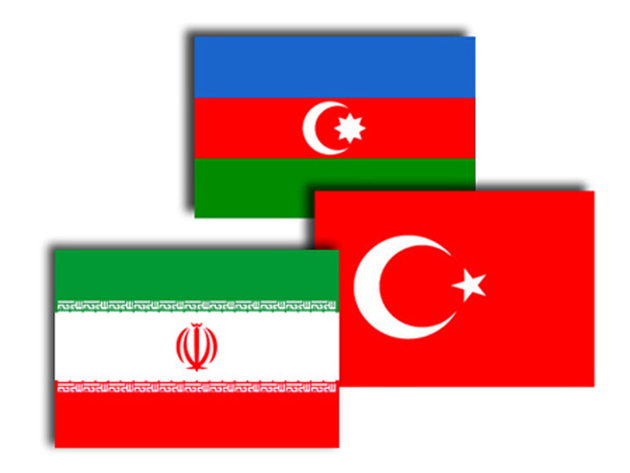For almost two weeks now, the Iranian-Azerbaijani crisis has been the main topic of regional media. Thus, Middle East Monitor writes that with the victory of Azerbaijan against Armenia in the Nagorno-Karabakh region almost completing its first year, the South Caucasus region does not yet seem ready to enter a phase of long-term stability. The peace agreement, sponsored by Turkey and Russia, succeeded in ending the war between the two countries and opened, for the first time, prospects for the possibility of reaching a comprehensive peace agreement between Baku and Yerevan, but it only addresses the local factors of this conflict, ignoring the external factors affecting it.
Three regional countries are involved in the issue: Russia, Iran, and Turkey, and while Moscow and Ankara managed to end last year's war and have peacekeeping forces in Karabakh, Tehran found itself side-lined in a new geopolitical equation, and its feelings of vulnerability were increased recently by growing Azeri-Israeli relations.
After the defeat of Armenia, Azerbaijan regained areas along the 130 km of its border with Iran, which Armenia had occupied in the 1990s. It also recovered part of the main highway linking Iran to Armenia via Azerbaijan, an important trade route to the Black Sea and Russia. Azerbaijan's decision to impose duties on trucks transporting goods to Armenia angered Tehran, and it responded by conducting military exercises on the border with Azerbaijan. This conflict quickly took on a regional aspect with Turkey announcing military manoeuvres with its ally, Azerbaijan, in the Nakhichevan region.
The marginalisation of Iran in the new Caucasian equation has awakened multifaceted Iranian concerns. On the one hand, it came at the expense of Turkey's growing influence, which will enable the Nakhichevan-Azerbaijan corridor project agreed upon in the peace agreement to reconnect it geographically with the Turkic-speaking countries in Central Asia. Therefore, Iran finds itself the biggest loser in this transformation, compared to the gains of Turkey and Russia. Iran's concerns are not limited to fear of isolation in the new situation, but also include the context of competition for energy supply lines in a region where pipelines shipping oil and natural gas to the West intersect. Since 1994, BP has invested more than $70 billion in energy and transportation development projects from Azerbaijan. The projects include a pipeline connecting the production of the Caspian Sea to the Turkish port of Ceyhan. Turkey's strengthening of its political and economic relations with the Turkic-speaking countries will help it in the future to develop the Baku-Tbilisi-Ceyhan pipeline to include Turkmenistan's oil and gas. This line would be a competitor to the proposed Iranian pipeline that runs south of Iran's Pars field towards Europe through Iran, Iraq, Syria and Lebanon, to supply European customers, as well as Iraq, Syria and Lebanon.
Meanwhile, Ahval with a reference to Hamidreza Azizi, a visiting fellow at the German Institute for International and Security Affairs (SWP), writes that any sharp military escalation risks drawing in Turkey. Azizi said that the chances of military hostilities breaking out between Azerbaijan and Iran remained low, but lingering tensions following last year’s war between Azerbaijan and Armenia in the disputed region of Nagorno-Karabakh are bubbling to the surface. Much of Iran’s anger towards Azerbaijan has revolved around the latter’s detention of Iranian truckers in Nagorno-Karabakh and disrupting their trade with Armenia. Turkey’s strengthened position in the South Caucasus, strengthened by increased military support for Azerbaijan, has not escaped Iran’s concerns, said Azizi. Moreover, Turkish firms have assumed the lion’s share of reconstruction projects in Nagorno-Karabakh.
Azizi said that Iran does not place Turkey on the same level as Israel as a security threat, and its close bonds with Azerbaijan are nothing new. However, he argues that rivalry with Turkey is taking a broader strategic context and Iran sees Ankara in a stronger position regionally after the Nagorno-Karabakh war. Turkey’s aspirations to serve as a transit route for East-West trade via projects such as China’s One Belt One Road initiative put it into direct competition with Iran’s own interest in playing a similar role.
Ankara’s push for energy cooperation in the Caspian Sea, together with Azerbaijan and Turkmenistan, to fulfill long-held aspirations of developing its gas transit role to Europe also rankles Iranian decision-makers. To address its concerns in the South Caucasus, Iran has recently turned to Russia for diplomatic support. Last week, Iranian Foreign Minister Hossein Amir-Abdollahian traveled to Moscow, but Sergei Lavrov did not accept claims of his Iranian counterpart and underscored the importance of the 3+3 format that includes the countries of the South Caucasus as well as Turkey and Iran.






